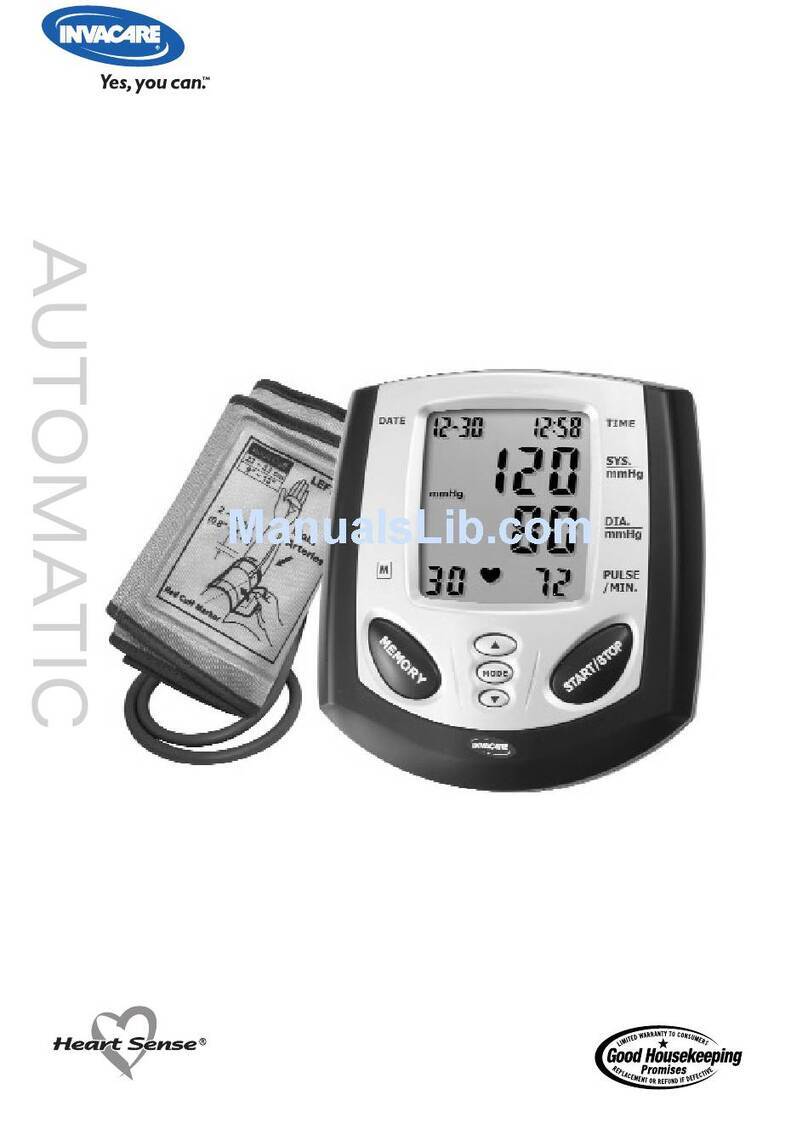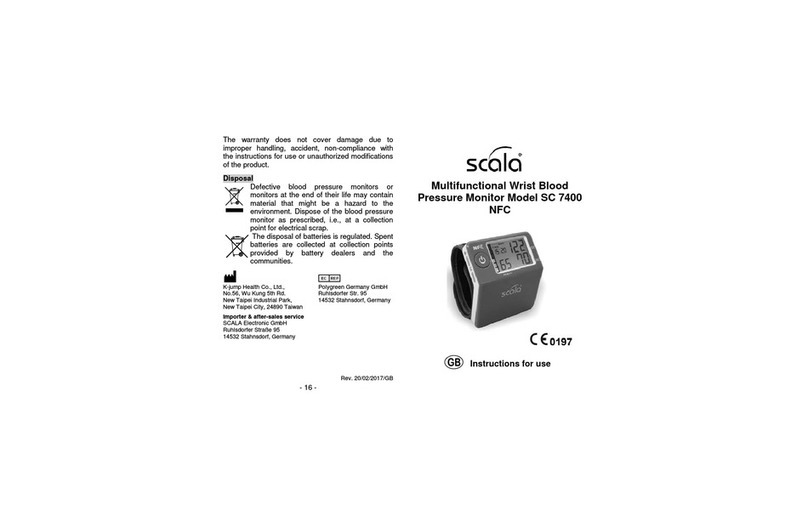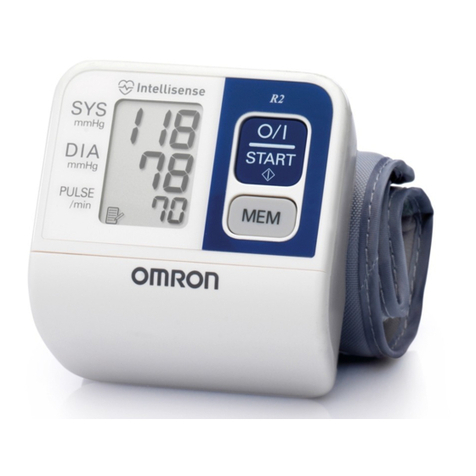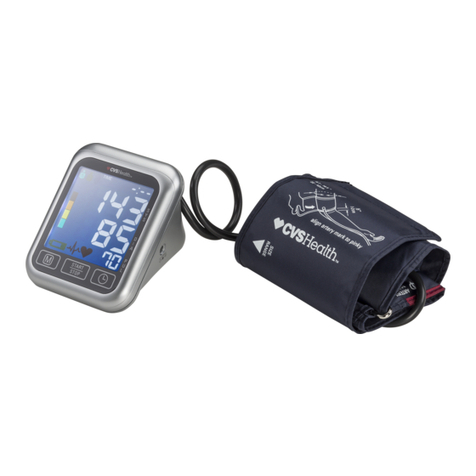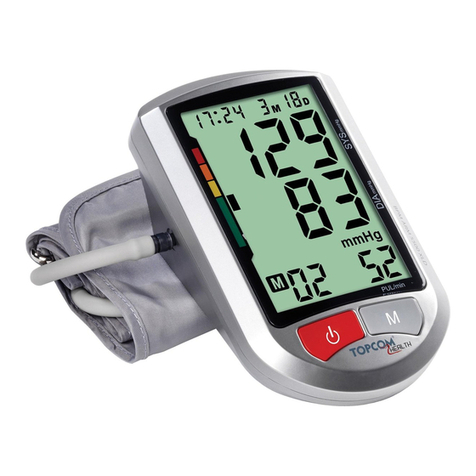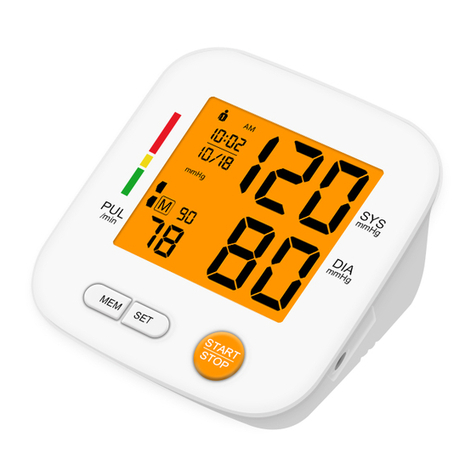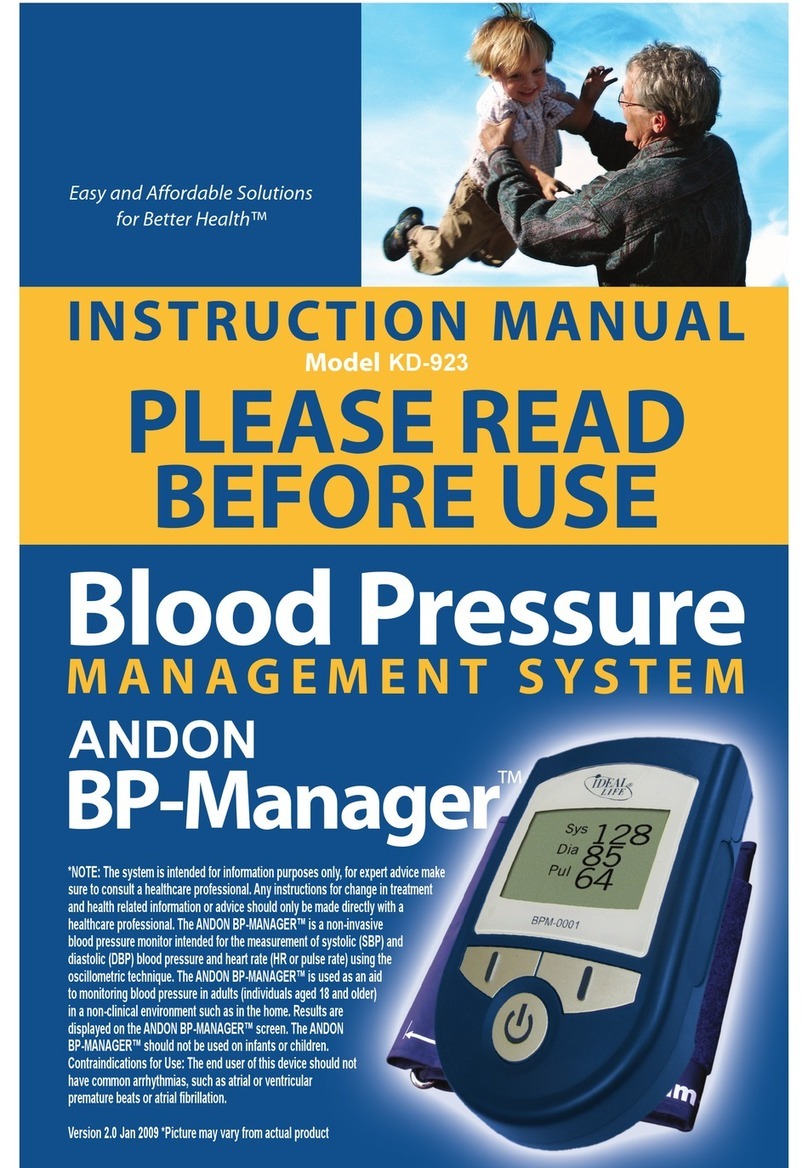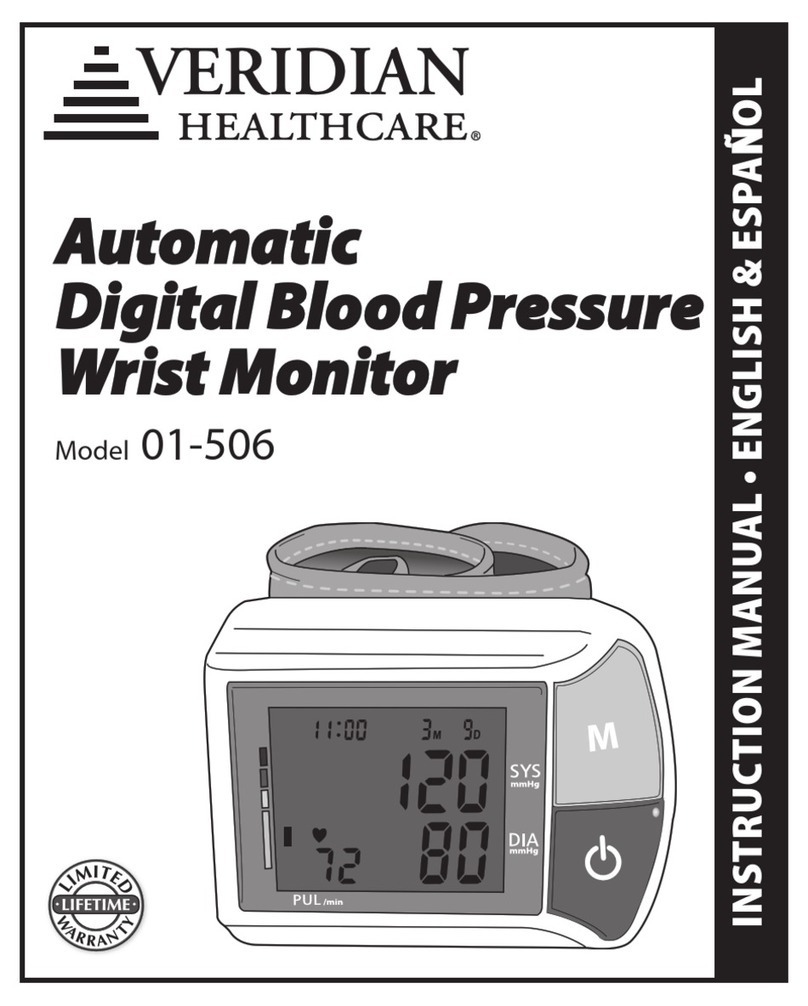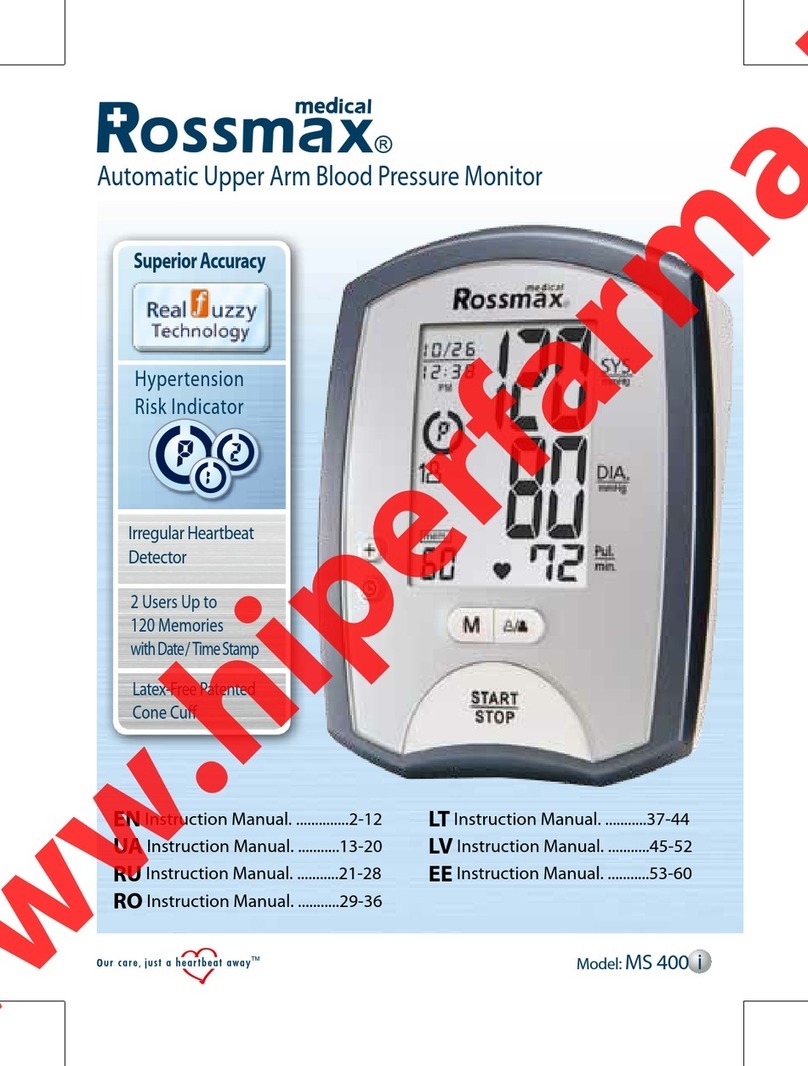NOOA TMB-1491 User manual

version:1.0
Congratulations on the purchase of your new NOOA Arm Blood Pressure
Monitor.
We recommend that you spend some time reading this instruction manual in
order to fully understand all the operational features it offers. Read all the
safety instructions carefully before use and keep this instruction manual for
future reference.
PO#2B1031 TMB-1491 说明书(英文-挪威语-芬兰语-丹麦语)(A0)
印色:四种语言封面:CMYK
内页:单黑
材质:128g铜版纸
尺寸:105*142 mm
Instruction Manual
Arm Blood Pressure Monitor
Model: TMB-1491 Ref: NOTMB1491

Table of Contents

Table of Contents
INTRODUCTION.................................................................................................................2
General Description
Indications for Use
Safety Information
PRODUCT OVERVIEW.......................................................................................................4
LCD Display
Monitor
BEFORE YOU START.........................................................................................................6
Installing and Replacing the Batteries
Measurement Principle
Setting Date, Time and Measurement Unit
MEASUREMENT.................................................................................................................9
Tie the Cuff
Start the Measurement
DATA MANAGEMENT........................................................................................................11
Recalling the Records
Deleting the Records
INFORMATION FOR USER..............................................................................................13
Tips for measurement
Care and Maintence
ABOUT BLOOD PRESSURE............................................................................................15
What are systolic pressure and diastolic pressure?
What is the standard blood pressure classification?
Why does my blood pressure fluctuate throughout the day?
Why do I get a different blood pressure at home compared to the hospital?
Is the result the same if measuring on the right arm?
TROUBLESHOOTING......................................................................................................17
SPECIFICATIONS.............................................................................................................18
CONTACT INFORMATION...............................................................................................19
COMPLIED EUROPEAN STANDARDS LIST...................................................................19
EMC GUIDANCE..............................................................................................................20
1
Table of Contents

Safety Information
The signs below might be in the user manual, labeling or other component.
They are the requirement of standard and using.
Symbol for “THE INSTRUCTION
MANUAL MUST BE READ”
Symbol for “COMPLIES WITH
MDD 93/42/EEC REQUIREMENTS”
Symbol for “MANUFACTURER”
Symbol for “SERIAL NUMBER”
Symbol for “TYPE BF APPLIED
PARTS”
Symbol for “ENVIRONMENT
PROTECTION - Electrical waste
products should not be disposed of
with household waste. Please recycle
where facilities exist. Check with your
local authority or retailer for recycling
advice”
Symbol for “Authorised Representative
in the European Community
EC REP
Symbol for “MANUFACTURE
DATE”
The product features blood pressure measurement, pulse rate measurement
and stores the results. The design provides you with two years of reliable service.
Readings taken by this product are equivalent to those obtained by a
trained observer using the cuff and stethoscope auscultation method.
This manual contains important safety and care information, and provides
step by step instructions for using the product.
Read the manual thoroughly before using the product.
Features:
60mm×40.5 mm Digital LCD display
Maximum 60 records
General Description
3rd technology: Measuring during inflation
(The updated technology in the world)
Indications for Use
The product is a digital monitor intended for use in measuring blood pressure
and heartbeat rate with arm circumferences ranging from 22 cm to 32 cm
( about 8¾˝-12½˝ ). It is intended for adult indoor use only.
2
INTRODUCTION

CAUTION
This product is intended for adult use only.
This product is intended for non-invasive measuring and monitoring of arterial blood
pressure.
It is not intended for the use on extremities other than the arm or for functions other than
obtaining a blood pressure measurement.
Do not confuse self-monitoring with self-diagnosis. This product allows you to monitor your
blood pressure. Do not begin or end medical treatment without asking a physician for
treatment advice.
If you are taking medication, consult your physician to determine the most appropriate time
to measure your blood pressure. Never change a prescribed medication without consulting
your Physician.
When the product was used to measure patients who have common arrhythmias such as
atrial or ventricular premature beats or atrial fibrillation, the best result may occur with
deviation. Please consult your physician about the result.
If the cuff pressure exceeds 40 kPa (300 mmHg), the product will automatically deflate.
Should the cuff not deflate when pressures exceeds 40 kPa (300 mmHg), detach the cuff
from the arm and press the START/STOP button to stop inflation.
The product is not AP/APG equipment and not suitable for use in the presence of a
flammable anesthetic mixture with air of with oxygen or nitrous oxide.
The operator shall not touch output of batteries and the patient simultaneously.
To avoid errors in measurement, please avoid the condition of strong electromagnetic field
radiated interference signal or electrical fast transient/burst signal.
Check that the product's functions carefully and ensure that it is in proper working condition
before being used.
This product is contraindicated for any female who may be suspected of, or is pregnant.
Besides providing inaccurate readings, the effects of this product on the fetus are
unknown.
Manufacturer will make available on request circuit diagrams, component parts list etc.
This product is not suitable for continuous monitoring during medical emergencies or
operations. Otherwise, the patient’s arm and fingers will become anaesthetic, swollen and
even purple due to a lack of blood.
Read the instruction manual and use the product properly.
Otherwise, the performance and lifetime of the product will be impacted and reduced.
During use, the patient will be in contact with the cuff. The materials of the cuff have been
tested and found to comply with requirements of ISO 10993-5:2009 and ISO
10993-10:2010. It will not cause any potential sensization or irritation reaction.
Please use ACCESSORIES and detachable parts specified/ authorised by
MANUFACTURER. Otherwise, it may cause damage to the product or danger to the user /
patients.
The product doesn’t need to be calibrated within the two years of reliable service.
Please dispose of ACCESSORIES, detachable parts, and the ME EQUIPMENT according
to the local guidelines.
Please use the soft cloth to clean the whole product. Don’t use any abrasive or volatile
cleaners.
3
INTRODUCTION

LCD display
SYMBOL DESCRIPTION
Systolic blood pressure High pressure result
Diastolic blood pressure Low pressure result
EXPLANATION
Pulse per minute Beats per minute, BPM
Deflating CUFF air is exhausting of deflating
Memory The displayed measurement values
is from the memory.
mmHg
kPa
Measurement Unit of the blood pressure
(1mmHg=0.133kPa)
Measurement Unit of the blood pressure
(1kPa=7.5mmHg)
Low battery Batteries are low and need to be replaced
Irregular heartbeat detection
Irregular heartbeat
Grade The grade of the blood pressure
kPa
mmHg
Current Time Year/Month/Day, Hour/Minute
Heartbeat detection during the
measurement
Heartbeat
4
PRODUCT OVERVIEW

Monitor
Includes
1.Arm Blood Pressure Monitor
(Model: TMB-1491 Ref: NOTMB1491)
4.Instruction Manual
3. 4×AAA batteries
2.Cuff (Type BF applied part)
(22cm~32cm)
Component list of
pressure measuring
system
1 Cuff
2 Air pipe
3 PCBA
4 Pump
5 Valve
BATTERY COMPARTMENT
CUFF
AIR HOSE
AIR CONNECTOR PLUG
LCD DISPLAY
MEM BUTTON
START/STOP BUTTON
SET BUTTON
(Please use NOOA
authorized cuff. The size
of the actual cuff please
refer to the label on the
attached cuff.)
5
PRODUCT OVERVIEW

Measurement Principle
This product uses the Oscillometric Measuring method to detect blood pressure.
Before every measurement, the product establishes a “zero pressure” equivalent
to the air pressure. Then it starts inflating the arm cuff, meanwhile, the product
detects pressure oscillations generated by beat-to-beat pulsatile, which is used
to determine the systolic and diastolic pressure, and also pulse rate.
The product also compares the longest and the shortest time intervals of
detected pulse waves to mean time interval then calculates standard deviation.
The product will displays a warning signal with the reading to indicate the
detection of irregular heartbeat when the difference of the time intervals is
over 25%.
•Open the battery cover.
•Install the batteries by matching
the correct polarity, as shown.
•Replace the cover.
Installing and Replacing the Batteries
Remove batteries if the product is not likely to be used for some time.
The old batteries are harmful to the environment, do not dispose them with other daily trash.
Remove the old batteries from the product and follow your local recycling guidelines.
CAUTION
Replace the batteries when:
the display shows .
the display dims.
the display does not light up.
Do not dispose of batteries in fire. Batteries may explode or leak.
Always use the correct battery
type (4 x AAA-sizes batteries).
6
BEFORE YOU START

Setting Date, Time and Measurement Unit
It is important to set the clock before using your blood pressure
monitor, so that a time stamp can be assigned to each record that is
stored in the memory. (The setting range of the year is: 2014—2054,
and the time format is:12 H)
1.When the monitor is off,
press and hold the S button
for 3 seconds to enter
the mode for year
setting.
Or when the monitor is off,
press the S button to display
the time. Then press and hold
the S button to enter the mode
for year setting.
2.Press the M button to change
the [YEAR].
Each press will increase the
numeral by one in a cycling
manner.
3.When you get to the correct
year,press the S button to
confirm.
7
BEFORE YOU START

4.Repeat steps 2 and 3 to set
the [MONTH] and [DAY].
5.Repeat steps 2 and 3 to set the [HOUR]
and [MINUTE].
7.After the unit is set,the LCD will display
“done” first, then display all the settings
you have made and then turn off.
6.Repeat steps 2 and 3 to set the [UNIT].
8
BEFORE YOU START

Rest for 5 minutes before
measuring.
Wait at least 3 minutes between
measurements. This allows your
blood circulation to recover.
For a meaningful comparison,
try to measure under similar
conditions. For example, take daily
measurements at approximately
the same time, position of upper
arm, or as directed by a physician.
Tie the cuff
1.Tie the cuff on your upper arm,
then position the tube off-center
toward the inner side of your arm
in line with your little finger.
2.The cuff should be snug but not
too tight. You should be able to
insert one finger between the
cuff and your arm.
3.Sit comfortably the arm you are testing
resting on a flat surface.
2~3cm
START
STOP
.Patients with Hypertension:
The middle of the cuff should be
at the level of the right atrium of the heart;
Before starting your measurement, sit
comfortably with your legs uncrossed, your
feet flat on the floor, and your back and arm
supported.
4
9
MEASUREMENT

1.When the monitor is off,
press the START/STOP button to turn on
the monitor, and it will finish the whole
measurement .
Adjust to zero.LCD display
Inflating and measuring. Display and save the
results.
Start the Measurement
2.Press the START/STOP button to power
off, otherwise it will turn off
within 1 minute.
START
STOP
START
STOP
10
MEASUREMENT

Recalling the Records
1. When the monitor is off,
please press the M button to
show the average value of
the latest three records.
2. Press the M or S button to
get the record you want.
The most recent record (1) is shown first. Each new measurement is
assigned to the first (1) record. All other records are pushed back one
digit (e.g., 2 becomes 3, and so on), and the last record (60) is
dropped from the list.
The current No. is No 2. The corresponding
time is P.M. 10:08.
The corresponding
date is January 1st.
CAUTION
DOWN
UP
The date and time
of the record
will be displayed
alternately.
11
DATA MANAGEMENT

If you did not get the correct measurement, you can delete all the
results by following steps below .
Deleting the Records
1. Press and hold the M button
for 3 seconds when the
monitor is in the memory
recall mode, the display
will show a flashing
“dEL ALL”.
2. Press the S button to
confirm deleting and
the monitor will display
“dEL dOnE” and then
turn off.
3. If there are no records,
when you press the M
button, This display will
show "---".
START
STOP
Note: To exit out of delete mode
without deleting any records,
press the START/STOP button
before pressing the S button
to confirm any delete commands.
12
DATA MANAGEMENT

Tips for Measurement
Within 1 hour
after dinner or drinking
Within 20 minutes
after taking a bath
In a very cold environment
Immediately measuring
after tea, coffee, smoking
When talking or moving your fingers
When you want to discharge urine
Measurements may be inaccurate if taken in the following
circumstances.
13
INFORMATION FOR USER

Care and Maintence
In order to get the best performance, please follow the
instructions below.
Store in a dry place and avoid the sunshine
Avoid intense shaking
and collisions
Use a damp cloth to remove dirt
Avoid touching water, and
clean it with a dry cloth if it gets wet.
Avoid dusty environments with
unstable temperatures
Do not attempt to clean the cuff with water
and never immerse the cuff in water.
14
INFORMATION FOR USER

Only a physician can tell your normal BP range.
Please contact a physician if your measuring
result falls out of the range. Please note that only
a physician can tell whether your blood pressure
value has reached a dangerous point.
What are systolic pressure and diastolic pressure?
press
artery vein
blood discharging
Systolic
relax
blood entering
Diastolic
When ventricles contract and pump blood out
of the heart, the blood pressure reaches its
maximum value in the cycle, which is called
systolic pressure. When the ventricles relax,
the blood pressure reaches its minimum value
in the cycle, which is called diastolic pressure.
What is the standard blood pressure classification?
The blood pressure classification published
by World Health Organization (WHO) and
International Society of Hypertension (ISH)
in 1999 is as follows:
Irregular Heartbeat Detector
CAUTION
The appearance of the IHB icon indicates that a pulse irregularity consistent with an
irregular heart-beat was detected during measurement. Usually this is NOT a cause for
concern. However, if the symbol appears often, we recommend you seek medical advice.
Please note that the product does not replace a cardiac examination, but serves to detect
pulse irregularities at an early stage.
CAUTION
SYS
DIA
<120
<80
120-129
80-84
130-139
85-89
140-159
90-99
160-179
100-109
≥180
≥110
Level
Blood
Pressure (mm Hg)
Optimal Normal High-normal Mild Moderate Severe
An irregular heartbeat is detected when a heartbeat rhythm varies while the product
is measuring the systolic and diastolic blood pressure. During each measurement,
this product records the heartbeat intervals and works out the standard deviation.
If the calculated value is larger than or equal to 15, the irregular heartbeat symbol
appears on the symbol when the measurement results are displayed.
15
ABOUT BLOOD PRESSURE

Why does my blood pressure
fluctuate throughout the
day?
Is the result the same
if measuring on the
right arm?
Why do I get a different
blood pressure at home
compared to the hospital?
START
STOP
START
STOP
1. Individual blood pressure varies
multiple times everyday. It is also
affected by the way you tie your cuff
and your measurement position, so
please take your measurements under
the same conditions.
2.you take medicine, your pressure will
vary more.
3.Wait at least 3 minutes before taking
another measurement.
Blood pressure is different throughout
the day due to weather, emotion,
exercise etc, Also, there is the “white
coat” effect, which means blood
pressure usually increases in clinical
settings.
What you need to pay attention
to when you measure your
blood pressure at home:
If the cuff is tied properly.
If the cuff is too tight or too loose.
If the cuff is tied on the upper arm.
If you feel anxious.
Taking 2-3 deep breaths before
beginning will be better for measuring.
Advice: Relax yourself for 4-5 minutes
until you calm down.
Using either arm is okay, but there
will be some different results for
different people. We suggest you
measure the same arm every time.
16
ABOUT BLOOD PRESSURE

This section includes a list of error messages and frequently
asked questions for problems you may encounter with your blood
pressure monitor. If the products not operating as you think it
should, check here before arranging for servicing.
PROBLEM SYMPTOM CHECK THIS REMEDY
No power
Low
batteries
Error
massage
Display will not
light up.
Batteries are exhausted. Replace with new batteries
Insert the batteries
correctly
Replace with new batteries
Batteries are inserted
incorrectly.
Display is dim or
shows Batteries are low.
E 1 shows The cuff is not secure. Refasten the cuff and then
measure again.
E 2 shows The cuff is very tight
E 3 shows The pressure of the
cuff is excess.
Relax for a moment
and then measure again.
E10 or E11
shows
E20 shows
The measurement
process does not detect
the pulse signal.
Loosen your clothing on
the arm and then
measure again.
EExx,shows on
the display.
A calibration error
occurred.
Retake the measurement.
If the problem persists,
contact the retailer.
E21 shows The treatment of the
measurement failed.
Relax for a moment and
then measure again.
Readjust the cuff, not too
loose or too tight and then
measure again.
The monitor detected
motion, talking or the
pluse is too poor
while measuring.
Relax for a
moment and then
measure again.
17
TROUBLESHOOTING

About 22cm~32cm
Type BF applied part
Temperature:-20℃-60℃
Relative Humidity: 10%RH-93%RH
Atmospheric Pressure: 50kPa-106 kPa
Temperature:5℃to 40℃
Relative humidity: ≤85%RH
Atmospheric pressure: 86kPa to 106kPa
Power supply Battery powered mode:
6VDC 4×AAA batteries
Display mode
Measurement mode Oscillographic testing mode
Measurement range
Measurement perimeter
of the upper arm
Weight Approx.284 g(Excluding the dry cells)
External dimensions
Attachment
Approx.110mm×110mm×41mm
4×AAA batteries,user manual
Mode of operation Continuous operation
Degree of protection
Protection against
ingress of water IP21
Accuracy
Normal working condition
Storage & transportation
condition
Software Version V01
Pressure:
5℃-40℃within±0.4kPa(3mmHg)
pulse value:±5%
Rated cuff pressure:
0kPa - 40kPa (0mmHg~300mmHg)
Measurement pressure: 5.3kPa-30.7kPa
(40mmHg-230mmHg)
pulse value: (40-199) beat/minute
Digital LCD V.A.60mm×40.5mm
WARNING: No modification of this equipment is allowed.
18
SPECIFICATIONS
This manual suits for next models
1
Table of contents
Languages:
Other NOOA Blood Pressure Monitor manuals

